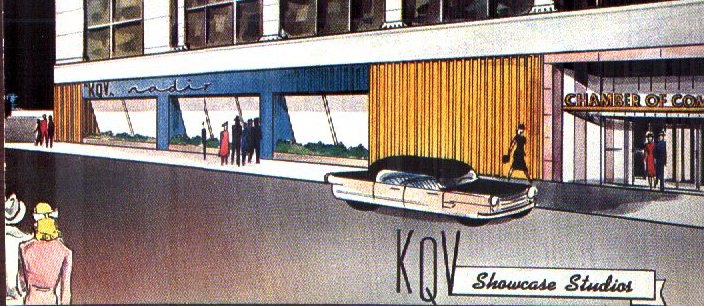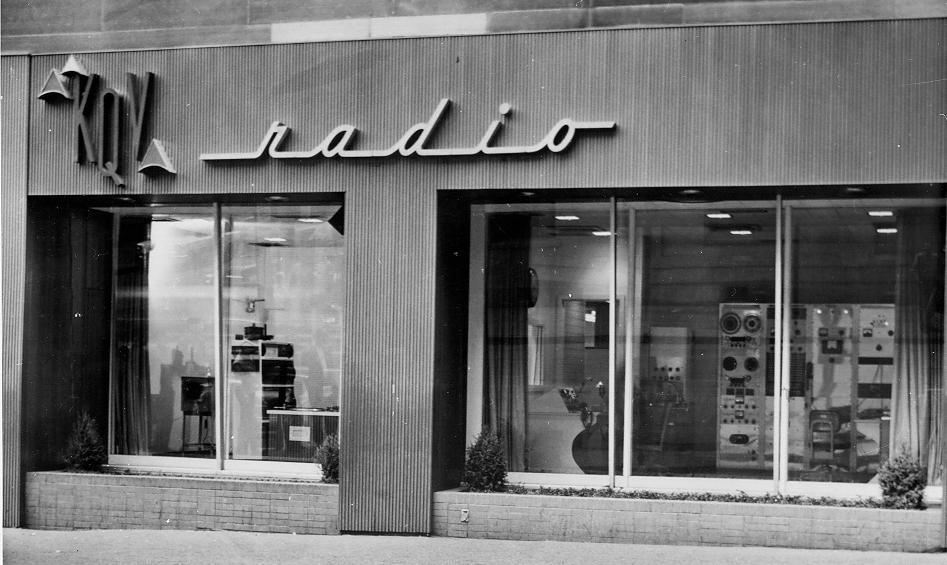Pittsburgh Press, Friday,
August 22, 1958. (page 39)
$85,000 Goes Into
KQV's Street Level
Studios On Corner
Passers-by in 7th Avenue
Can See
Operations of Radio Station
By Fred Remington
Any day now
Pittsburghers will be getting their first look at the new KQV studios,
built at a cost of $85,000 and unique in American radio stations.
Behind the
wooden fence at the Smithfield and Seventh corner of the Chamber of Commerce
building, workmen are installing the gold and blue aluminum facing of that
portion of the building. Already in are the huge double windows through
which passers-by can watch the KQV disc jockeys and newscasters at work.
The station's broadcasts will be piped out to the sidewalk, softly so as
not to bemuse passing traffic with music and commercials.
A special
blazer-type jacket is being designed for KQV's on-the-air personnel, since
they shortly will be performing in front of the live audiences passing
on Seventh Avenue.
Inside, it
is hard to recall that the chic, coolly modern offices and studios once
were a drug store. The studios you'll see from Seventh Avenue are
suspended from above and real gingerly on rubber treads to eliminate vibration
from the street.
All in all,
KQV has changed it's physical appearance as completely as it has changed
from it's old network format to it's present Top Forty programming.
"When we
moved down from the 14th floor." said Ralph Beaudin, the youthful general
manager who has made such sweeping changes in Pittsburgh's second oldest
radio outlet, "we left everything up there except seven typewriters."
Pittsburgh Press, Tuesday,
Oct. 7, 1958. (page 41)
Street Crowds applaud
KQV Staff
By Fred Remington
At KQV, Pittsburgh's
most visual radio station; announcers and disc jockeys are pretty well
over the nervousness they experienced at working in view of Seventh Avenue
traffic. There's not a minute of the day or night that someone isn't
looking in on KQV's shows through the big double glass, ground floor windows.
On day three
staffers were recording a commercial in one of the fish-bowl studios.
The sound was audible in the street where a throng was watching the proceedings.
The three who were
doing the 30 second spot, Chuck Doherty, Alan Boal and Roy Elwell couldn't
get it down to suit them, and did it over and over. At length Doherty
held up his hand, thumb and forefinger, forming a ring of satisfaction.
The crowd burst into a cheer.
"We've timed
the crowds." said Ralph Beaudin, KQV's general manager. "The average
person watches for 2 1/2 records or for one 5 minute newscast."
The KQV disc
jockeys and newsmen are forbidden to make reference on the air to crowds
outside on the street, the theory being it would give the radio audience
a sense of being left out of something.
Pittsburgh Press, Tuesday,
March 3, 1959. (page 38)
KQV Light Panel Draws
Questions
By Fred Remington
KQV gets
around 20 phone calls a week and as many as a dozen persons dropping into
the station seeking an explanation of it's "light panel." The panel is
in the station's ground floor studios in the Chamber of Commerce building,
visible to passers-by on the Seventh Avenue side.
It has dozens
of small red, green, amber and white lights which flash in varying patterns.
Meanwhile the station's music is softly piped to the outside of the building.
"If you
listen to the music and watch the lights you quickly see the rhythm of
the music in the pattern of the flashing lights/" says Ralph Beaudin, KQV's
manager. "Different frequencies or pitches activate different circuits.
A full orchestra will light up the whole board."
For all
it's value as a conversation piece, the panel has never been given a name. |


